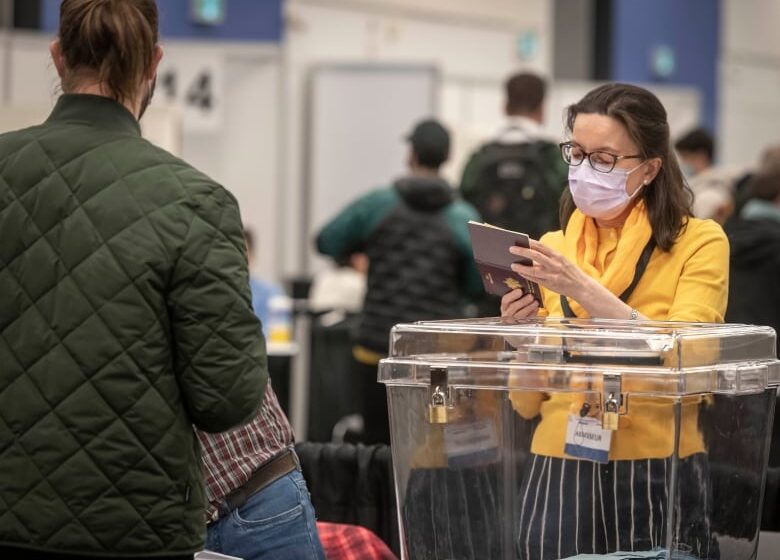Olympic tennis bracket 2024: Full draw, schedule for men’s and

Thousands of French expats in Montreal wait hours to cast vote for next president
French citizens living in Montreal turned out in droves Saturday to cast their ballots in the first round of France’s presidential election.
Voters in France head to the polls on Sunday. But for citizens outside the country, Saturday was their chance to vote.
In Montreal, voters waited in a slow-moving line that wrapped more than once around Palais des congrès in the city’s downtown. Some people waited nearly three hours to cast their vote.
“We know the line is long [but it’s moving well], that you’re all eager to vote, we’re doing our best,” read a tweet from the French Consulate in Montreal earlier in the afternoon.
The polls in Canada for the French election are open from 8 a.m. to 7 p.m. ET.
<a href=”https://twitter.com/hashtag/ElectionFRMtl?src=hash&ref_src=twsrc%5Etfw”>#ElectionFRMtl</a> Nous savons que la file est longue (mais elle avance bien), que vous êtes tous impatients de voter, nous faisons notre maximum, et nous remercions tous nos concitoyens bénévoles pour leur aide. 🙏 <a href=”https://t.co/n3mXjAIoXW”>pic.twitter.com/n3mXjAIoXW</a>
—@FranceaMontreal
Montreal has the largest community of French expatriates outside of Europe. Some 67,132 voters are registered to vote here — approximately 10,000 more than for the last elections in 2017.
“I think people here, living in Montreal, living in Quebec, are really part of the local society and the local community — but they also have in their heart their national belonging,” said Sophie Lagoutte, the general consular of France in Montreal.
And it appeared the rain, long lineups and wait times didn’t stop voters from making their voices heard.
Omar Djeziri waited two hours in line at Palais des congrès to cast his vote. He said voting was important, since his family still lives in France.
“I want to decide with them. I’m still interested in French politics even if I live here,” he said.

On Saturday, Fouad Benhaida voted for the first time in a French election, and he brought along his son as a teaching moment.
“This is not just a right, but this is an obligation that everybody has to do it,” he said. “I’m living now here, but maybe tomorrow I will go back there and I want to have a good country.”
In Ottawa, two polling stations were set up at the private school Lycée Claudel — one reserved for voters residing in the Outaouais, and the second for voters in Ottawa.
Julien Le Roy cast his ballot there, and said he voted even though he wasn’t particularly inspired by the presidential race.
“The excitement wasn’t really there,” Le Roy told Radio-Canada in a French-language interview. “I’m going to vote because I think it’s still important, but there’s not a lot of enthusiasm.”
Echoes of 2017
The long wait times to get to a ballot box weren’t the only similarities to the 2017 election.
The choice for voters is almost a repeat of five years ago, with incumbent President Emmanuel Macron trying to fend off his main challenger, Marine Le Pen.
In 2017, Macron was elected as the youngest French president, and he’s now seeking a new mandate.
He is among 12 candidates in the running for the presidency. The winner is required to capture more than 50 per cent of the vote, and if that doesn’t happen a run-off election with the two highest vote-getters will be held on April 23 for French nationals in Montreal and on April 24 in France.

Macron said Friday he was confident heading into the weekend’s election, despite far-right rival Le Pen narrowing the gap in opinion polls days before the first-round vote.
Polling companies say Le Pen, who’s running in her third presidential race, would likely finish second behind Macron if they both advance to the final round.
Results of the pivotal first round of voting will start coming in Sunday.
